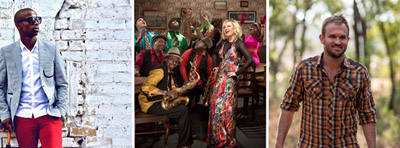|
 |
Zakes Bantwini, Mango Groove and Robbie Wessels
Photos: Supplied |
Kovsie Rag Community Service will start 2014 off with the well-known Rag festivities, with enthusiastic students already starting with float building in January. The theme for Rag CS 2014 is ‘Movies.’
As from 20 January, a cheerful atmosphere will be present at the Kovsie Rag farm, with senior and junior students working hard, while social cohesion is developing between them. Great entertainment will be part of these festivities, with the likes of DJ Euphonik and Adam performing on 31 January.
In the midst of all these activities, the annual ‘Chicken Run’ evening collections will take place on 21, 23 and 28 January, as well as the Ritsim sales in Bloemfontein and surrounding areas on 24-25 January.
The hard work will reach its peak with the judging of the floats on the morning of 1 February, after which the floats will depart at 09:00 for the first procession of the day. This route will end at Twin City Mall at 11:00, where 10 000 meals will be distributed to communities in Heidedal and Mangaung. Learners from Heidedal schools will entertain the public with their talents.
Our very popular family festival will already start at 16:00 with the opening of the gates at Chevrolet Park Cricket Stadium. Young and old will be entertained by well-known and vibrant artists, such as Robbie Wessels, Mango Groove, Zakes Bantwini, as well as a spectacular firework show. Come early to ensure a great spot on the grass.
The float winners will be announced at 17:00, whereafter the main procession of the day will depart from the Tempe robot in Nelson Mandela Drive at 18:00. The public can look forward to this ever popular procession through the streets of Bloemfontein, with decorated floats and students cradling collection tins proceeding to Chevrolet Park. The 2012/2013 UFS Rag queen, Mr Rag and their retinue will greet the public from the main float. Finalists for the 2013/2014 UFS Rag queen and Mr Rag titles, as well as drum majorettes, will also accompany the procession.
Do not miss out on this wonderful family festival – come early, bring your family and picnic blanket/chairs to ensure a great spot on the grass – a variety of refreshments will be on sale.
Tickets available from Computicket and entrance gates.Tickets: R60 per person
R30 per child under 12
We would also like to make use of this opportunity to remind you of our vibrant 2013/2014 UFS Rag coronation ball, where the UFS Rag queen and Mr Rag CS for 2014 will be crowned on 14 February 2014 in the Callie Human Centre, UFS Campus.
Limited tickets will be available at R500 per couple and can be bought from the Rag Community Service office from 5 February 2014.
Enquiries: Karen Scheepers +27(0)51 401 2423 (
ScheepersK@ufs.ac.za )
Esmé Wessels +27(0)51 401 3769 (
Wesselse@ufs.ac.za )